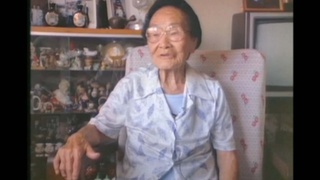Interviews
First day of school
So, first day of school, my mother, who couldn’t understand or speak any English, put her laundry aside to take me to school. And so, she didn’t know what class to enroll me in. So, even if the teacher says something, she didn’t understand. So, finally, she was so frustrated and she put me in one class—and we had only benches in those days, wooden benches—and she sat me in front. And so, sitting down there, the kids of other ethnic groups, they couldn’t speak English either—Filipino kids, you know, all them. They spoke their parent’s native tongue.
So we just looked at each other, stared at each other. And then, here in walked a huge lady, you know. And to me, she looked like a giant because I’m only 7 years old. And she had gray, wiry hair and blue eyes, and she was so fair. And that’s the first time I’ve ever seen a Caucasian on the plantation because we lived in segregated camps. And so, when she approached me, and she must’ve asked me what is your name? And because I didn’t understand English, and when she bent over me, I thought she was going to devour me. And I shrieked, "Obake! Obake!," you know. I just screamed at the top of my voice, and I ran out to the front and I clung to the pillow in the front. And she ran after me, and she tried to hug me. And the more she tried to hug me, the more I screamed. So that was my orientation into the American school.
Date: February 19, 2004
Location: Hawai'i, US
Interviewer: Lisa Itagaki, Krissy Kim
Contributed by: Watase Media Arts Center, Japanese American National Museum.
Explore More Videos

Teacher who helped with lisp
(b.1926) Democratic politician and three-term Governor of Hawai'i

Little interaction with parents
(1926 - 2012) Scholar and professor of anthropology. Leader in the establishment of ethnic studies as an academic discipline

Politics in ethnic studies
(1926 - 2012) Scholar and professor of anthropology. Leader in the establishment of ethnic studies as an academic discipline

Center for Japanese American Studies in community
(1926 - 2012) Scholar and professor of anthropology. Leader in the establishment of ethnic studies as an academic discipline

Involvement with ethnic studies
(1926 - 2012) Scholar and professor of anthropology. Leader in the establishment of ethnic studies as an academic discipline

Testing assumptions of Japanese scholars
(1926 - 2012) Scholar and professor of anthropology. Leader in the establishment of ethnic studies as an academic discipline

Sings traditional plantation labor song (ho-le ho-le bushi) in Japanese and Hawaiian
(b.1900) Issei plantation worker in Hawai'i.

Grandmother's influence on decision to go to Japan
(b.1942) Japanese American ceramist, who has lived in Japan for over 30 years.

Training for football by carrying 100-lb bags of grass over mountains
(b.1925) Nisei of Okinawan descent. Had a 38-year career in Japan as a baseball player, coach, scout, and manager.

Teaching at the military language school during World War II
(b. 1924) Political scientist, educator, and administrator from Hawai`i

Lesson learned from community college faculty
(b. 1924) Political scientist, educator, and administrator from Hawai`i

Rewards of teaching
(b. 1924) Political scientist, educator, and administrator from Hawai`i

Japanese school
(b.1924) Japanese Canadian Nisei. Interpreter for British Army in Japan after WWII. Active in Japanese Canadian community

Strict school policy of separating boys and girls in Japan
(b.1920) Japanese Canadian Nisei. Established the Ikenobo Ikebana Society of Toronto

Growing up outside of Portland’s Japanese community
(b. 1921) Nisei businessman. Established "Made in Oregon" retail stores
